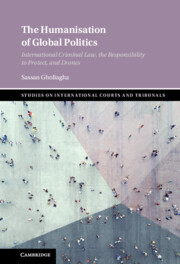2 results
5 - Heuristics and Positions
-
- Book:
- The Humanisation of Global Politics
- Published online:
- 25 August 2022
- Print publication:
- 01 September 2022, pp 102-117
-
- Chapter
- Export citation

The Humanisation of Global Politics
- International Criminal Law, the Responsibility to Protect, and Drones
-
- Published online:
- 25 August 2022
- Print publication:
- 01 September 2022

